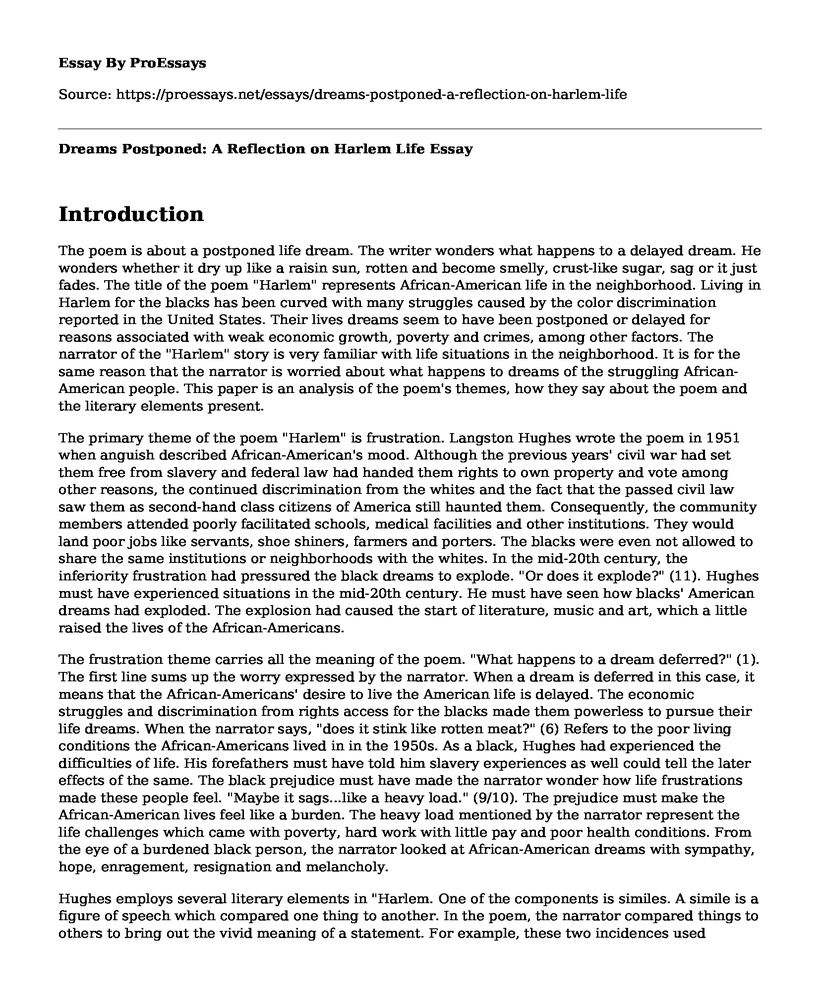Introduction
The poem is about a postponed life dream. The writer wonders what happens to a delayed dream. He wonders whether it dry up like a raisin sun, rotten and become smelly, crust-like sugar, sag or it just fades. The title of the poem "Harlem" represents African-American life in the neighborhood. Living in Harlem for the blacks has been curved with many struggles caused by the color discrimination reported in the United States. Their lives dreams seem to have been postponed or delayed for reasons associated with weak economic growth, poverty and crimes, among other factors. The narrator of the "Harlem" story is very familiar with life situations in the neighborhood. It is for the same reason that the narrator is worried about what happens to dreams of the struggling African-American people. This paper is an analysis of the poem's themes, how they say about the poem and the literary elements present.
The primary theme of the poem "Harlem" is frustration. Langston Hughes wrote the poem in 1951 when anguish described African-American's mood. Although the previous years' civil war had set them free from slavery and federal law had handed them rights to own property and vote among other reasons, the continued discrimination from the whites and the fact that the passed civil law saw them as second-hand class citizens of America still haunted them. Consequently, the community members attended poorly facilitated schools, medical facilities and other institutions. They would land poor jobs like servants, shoe shiners, farmers and porters. The blacks were even not allowed to share the same institutions or neighborhoods with the whites. In the mid-20th century, the inferiority frustration had pressured the black dreams to explode. "Or does it explode?" (11). Hughes must have experienced situations in the mid-20th century. He must have seen how blacks' American dreams had exploded. The explosion had caused the start of literature, music and art, which a little raised the lives of the African-Americans.
The frustration theme carries all the meaning of the poem. "What happens to a dream deferred?" (1). The first line sums up the worry expressed by the narrator. When a dream is deferred in this case, it means that the African-Americans' desire to live the American life is delayed. The economic struggles and discrimination from rights access for the blacks made them powerless to pursue their life dreams. When the narrator says, "does it stink like rotten meat?" (6) Refers to the poor living conditions the African-Americans lived in in the 1950s. As a black, Hughes had experienced the difficulties of life. His forefathers must have told him slavery experiences as well could tell the later effects of the same. The black prejudice must have made the narrator wonder how life frustrations made these people feel. "Maybe it sags...like a heavy load." (9/10). The prejudice must make the African-American lives feel like a burden. The heavy load mentioned by the narrator represent the life challenges which came with poverty, hard work with little pay and poor health conditions. From the eye of a burdened black person, the narrator looked at African-American dreams with sympathy, hope, enragement, resignation and melancholy.
Hughes employs several literary elements in "Harlem. One of the components is similes. A simile is a figure of speech which compared one thing to another. In the poem, the narrator compared things to others to bring out the vivid meaning of a statement. For example, these two incidences used similes. "Does it dry up like a raisin in the sun?" (3/4) and "Does it stink like rotten meat?" (6). In the first line, the writer compared the drying of the dream to a half-way dried grape. He intended to bring out the meaning of dryness. The second line compared the stinking of the postponed dream to rotten meat. In this occasion, he wanted to press on the smell of the dream. Personification is another element used in the poem. Personification is a figure of speech which gives human qualities to non-living things. An example in the poem is where the narrator wonders whether the dream run. He wonders whether the dream festers like a sore "and then run?" (5). The writer gives the dream human abilities to run. A dream is a non-living thing which is given living thing qualities. The application of the figure of speech is to empathize on the meaning of dream vanish. One more literary component is anaphora. Anaphora is the repetition of word or words in a poem. Anaphora is used in several cases, especially where the lines end up with a question mark. Examples of anaphora in the poem are seen in lines 2, 6 and 11. The repetitive words are "does it." The phrase is used in a questioning form. It implies wonder. The narrator uses the anaphora to give different options of what happens after the dream is deferred. In line 3, 8 and 10 anaphora is also applied. The word "like" is used to compare a thing with another.
Work Cited
Hughes, Langston. "Harlem by Langston Hughes." Poetry Foundation, 1994, www.poetryfoundation.org/poems/46548/harlem. Accessed 13 June 2019.
Cite this page
Dreams Postponed: A Reflection on Harlem Life. (2023, Jan 22). Retrieved from https://proessays.net/essays/dreams-postponed-a-reflection-on-harlem-life
If you are the original author of this essay and no longer wish to have it published on the ProEssays website, please click below to request its removal:
- A Literary Essay Sample: Conflict Between Romanticism and Realism in Jane Austen's Sense and Sensibility
- Christianity V. Paganism in Beowulf Essay
- Willy from The Death of A Salesman: Character Analysis Essay
- Essay Sample on Choices Made in John Updike Short Story
- Character Analysis Essay on Tom Buchanan
- Essay Example on Poetry: Conveying Ideas Through Stylistic Devices
- Essay Example on The Beast of War: Tim O'Brien's The Things They Carried







